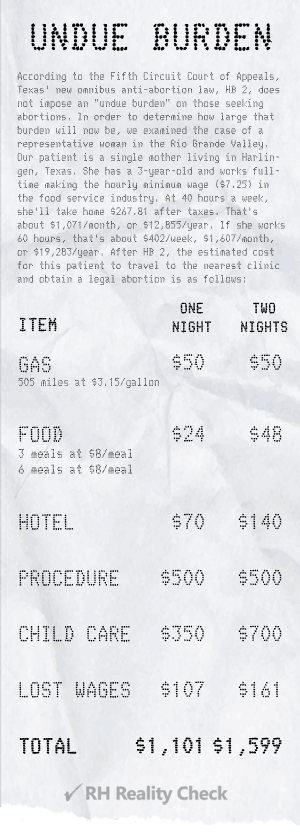No Undue Burden? What Texas’ HB 2 Means for Maria
For a woman like "Maria," a representative 26-year-old living in Texas' Rio Grande Valley, obtaining a legal abortion procedure will now cost more than a month's wages, not to mention considerable lost time. The car ride alone will take her about seven hours—a trip you can experience yourself in the following videos.

Read more of our articles on Texas’ omnibus anti-abortion law here.
The Fifth Circuit Court of Appeals in New Orleans has ruled that the State of Texas can now enforce HB 2, the omnibus anti-choice law that mandates that legal abortion facilities meet the standards of ambulatory surgical centers and that doctors who provide abortions have admitting privileges at local hospitals. HB 2 was opposed as medically unnecessary—and even dangerous—by state- and national-level major medical associations. Anti-choice lawmakers claimed, against all evidence to the contrary, that HB 2 would increase the “health and safety” of Texans who seek legal abortion care.
The law also bans abortion after 20 weeks, and severely limits the provision of medication abortion.
In light of this ruling, here are the burdens women like Maria will face.
Maria* is a representative 26-year-old woman living in Harlingen, Texas, who finds herself pregnant. She is unable to have another child right now.
Maria works full time—more often, up to 60 hours a week—for minimum wage at a laundromat in Harlingen about 30 miles from Matamoros, Mexico. Before anti-choice lawmakers passed HB 2, she could have accessed legal abortion care near her home in Harlingen, or traveled 40 minutes away to McAllen for similarly safe, legal abortion care.
Like two-thirds of people who seek abortion care in the United States, Maria is a mom. She’s raising a 3-year-old, but José’s father is out of the picture. She wants a better life for José and hopes to be able to see him go to college.
Based on a workweek of 40 hours, we calculate that Maria takes home $267.81 a week after taxes (about $1,071 a month or about $12,855 a year). When she is able to get as many as 60 hours a week, she takes home $401.72 ($1,607 a month or about $19,283 a year). Rent, gas, utilities, food, clothing, and health care for José, who has had chronic ear infections, eat up her disposable income.
Usually, Maria’s aunt takes care of her son while she’s at work, but her aunt, who has diabetes and has high blood pressure, has been in poor health. Maria is concerned about the pressure it would put on her to watch José for two days without a break, and does not want her aunt to worry about Maria traveling 500 miles round-trip to what is now the closest legal abortion clinic, located in San Antonio.
Maria is nine weeks pregnant. She wants to obtain an abortion so she can focus her efforts on raising José and lifting her family out of poverty. She doesn’t want to risk taking pills obtained illegally at a flea market, and she knows that using something like a bleach douche or a coat hanger to end her pregnancy could kill her, leaving José without his mom.
Maria will have to hire a babysitter. Her lowest-cost option is to hire a student from the University of Texas Pan-American or UT Brownsville to care for José for two days. If she can not find one available whom she trusts to care for José overnight and for many hours on end, she will have to engage a professional nanny service at a much higher cost. She’s also worried about her car, a 10-year-old Chevy that’s broken down twice in the last year, and is in need of new tires and new brakes, for which she has been saving a little at a time.
Once she’s found child care, Maria makes an appointment at the nearest legal abortion provider in San Antonio, and she knows that she’ll need to spend at least 36 hours away from home. She’s requested at least two days off work—time off that will cost her $107 on a week when she has two shifts during that period and $161 in lost wages during a week when she’s successfully secured three shifts. She’s going to leave her home around noon on a Tuesday, and head to the San Antonio hotel room she’s reserved mere days in advance of her procedure, knowing that the lost income will make a tight budget even tighter.
On Wednesday, she’ll have a state-mandated ultrasound. Because Maria lives more than 100 miles from a legal abortion facility, she can bypass the government-required 24-hour waiting period between the ultrasound and surgical abortion, which together will cost her around $500. Medication abortion administered with pills would be a more affordable option for many patients in Texas. This is, however, not an option for women like Maria, because, despite medical protocol and evidence-based medical practices that say otherwise, Texas law now mandates she visit her doctor four separate times if she opts for medication abortion, making this ostensibly cheaper and safe option inaccessible to a person who lives 250 miles from the nearest legal abortion provider.
It’s possible that after Maria’s ultrasound, she’ll have her legal abortion procedure and be able complete the nearly four-hour drive home late at night, relieving the babysitter she’s hired at a rate of around $350 per day. More likely, by the time she gets in and is done, she’ll need to stay another night in San Antonio.
If that’s the case and she needs to spend two nights in San Antonio, Maria will wake up early and drive home to Harlingen Thursday morning—having driven close to eight hours round trip over two days (if traffic is reasonable and she has no problems with her car) to access a legal abortion procedure that, a year ago, she could have gotten minutes from her home.
All told, obtaining a legal abortion procedure will cost her between $1,101.00 and $1,599.00 depending on the number of nights away from home—more than a month’s wages, lost time, and considerable personal worry. This, according to the Fifth Circuit Court of Appeals, does not constitute an undue burden.
Below, you can join Maria on her entire journey from the Rio Grande Valley to San Antonio and back—if, that is, you have seven or so hours to spare.
*Maria is a fictional woman, whose life circumstances are based on evidence gathered from talking to Texas travel professionals, parents, and child-care workers, and from calculations based on data from PayCheckCity, the U.S. Census Bureau, and Google Maps.

